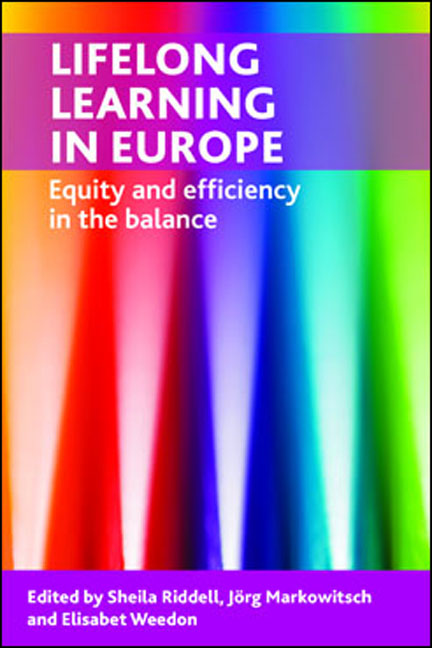Book contents
- Frontmatter
- Contents
- List of figures, tables and case studies
- Notes on contributors
- List of contributors, by country, to the EU Sixth Framework Project ‘Towards a Lifelong Learning Society in Europe: The Contribution of the Education System’ (LLL2010)
- one Lifelong learning and the generation of human and social capital
- two Lifelong learning and the wider European socioeconomic context
- three Neoliberal and inclusive themes in European lifelong learning policy
- four Formal adult education in the spotlight: profiles, motivations and experiences of participants in 12 European countries
- five The sociodemographic obstacles to participating in lifelong learning across Europe
- six The qualification-providing enterprise? Support for formal adult education in small and medium-sized enterprises
- seven Reducing or reinforcing inequality: assessing the impact of European policy on widening access to higher education
- eight Conclusion: the role of lifelong learning in reducing social inequality at a time of economic crisis
- Technical annex to Chapter Four
- Glossary of terms and abbreviations
- Index
three - Neoliberal and inclusive themes in European lifelong learning policy
Published online by Cambridge University Press: 01 September 2022
- Frontmatter
- Contents
- List of figures, tables and case studies
- Notes on contributors
- List of contributors, by country, to the EU Sixth Framework Project ‘Towards a Lifelong Learning Society in Europe: The Contribution of the Education System’ (LLL2010)
- one Lifelong learning and the generation of human and social capital
- two Lifelong learning and the wider European socioeconomic context
- three Neoliberal and inclusive themes in European lifelong learning policy
- four Formal adult education in the spotlight: profiles, motivations and experiences of participants in 12 European countries
- five The sociodemographic obstacles to participating in lifelong learning across Europe
- six The qualification-providing enterprise? Support for formal adult education in small and medium-sized enterprises
- seven Reducing or reinforcing inequality: assessing the impact of European policy on widening access to higher education
- eight Conclusion: the role of lifelong learning in reducing social inequality at a time of economic crisis
- Technical annex to Chapter Four
- Glossary of terms and abbreviations
- Index
Summary
Introduction
When lifelong learning emerged as a key theme of educational policy in the 1990s, international organisations played a decisive role. Some, particularly the Organisation for Economic Cooperation and Development (OECD) and the United Nations’ Educational, Scientific and Cultural Organisation (UNESCO), had a ‘track record’: in the 1970s UNESCO had enthused about ‘lifelong education’ (Faure et al, 1972), the OECD about ‘recurrent education’ (OECD 1973). In contrast, the European Union had no such pedigree. Although the Council of Europe had advocated ‘permanent education’ as early as 1966 (Council of Europe, 1970), the EU itself had been silent. Yet, as Field (2006) suggests, in the 1990s the EU's role was decisive.
Since then, lifelong learning has developed from a policy concept popular among international organisations into a central feature in educational, welfare and labour market policies – and a key element in private and ‘third’ sector activity – across the ‘developed’ world. This chapter is concerned with the development and nature of the EU's thinking on lifelong learning, with the part this plays in shaping public policy within member states, and with how the EU interacts with other ‘actors’ in relation to lifelong learning.
The core of the chapter is an historical account of the evolution of the EU's thinking and practice on lifelong learning. We pursue this chiefly through the continuing tension between two policy themes: education (and training and learning) for productivity, efficiency and competitiveness on the one hand, and education for broader personal development and ‘social inclusion’ on the other. However, we begin by outlining three areas of debate within the academic literature. The historical account will, we believe, serve to illuminate these debates.
Areas of debate
Economic and social aims
In a much-cited phrase, Boshier described lifelong learning as ‘human resource development in drag’ (1998, p 4). His point was the contrast between the broad, humanistic approach of the Faure Report and the vocational character of the language used around lifelong learning in the 1990s. The broad thrust of his critique has been widely accepted. As Rizvi and Lingard argue, a ‘particular social imaginary of globalization, namely neoliberalism, has underpinned educational policy shifts around the world over the last two decades’ (2010, p 184).
- Type
- Chapter
- Information
- Lifelong Learning in EuropeEquity and Efficiency in the Balance, pp. 39 - 62Publisher: Bristol University PressPrint publication year: 2012

